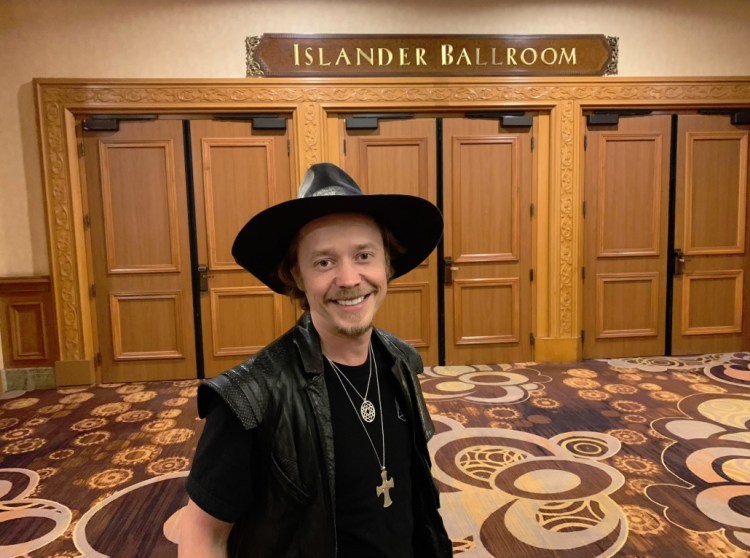Brock Pierce is a blockchain billionaire, one of the people who got into cryptocurrency when Bitcoin was in its infancy. In fact, he mined his first 50,000 Bitcoins at almost no cost. And then, he misplaced the hard drive, losing out on something like $320 million at today’s Bitcoin price.
But Pierce shrugs it off, as he was way ahead of the game in other ways, seeing the potential of blockchain — a transparent and secure decentralized ledger — and cryptocurrency, a digital currency which uses encryption and blockchain to securely regulate the currency and verify the transfer of funds. Pierce has been one of the pioneers of crypto, and Forbes pegged him at No. 9 in cryptocurrency wealth with holdings of about $1 billion — an amount he has pledged to give away to charity. I interviewed him at the CoinAgenda cryptocurrency event in Las Vegas.
Now 37, Pierce was a child actor in The Mighty Ducks film. He went on to get involved with the founder of Digital Entertainment Network, an early Internet entertainment company, and there (still a teen at the time), he was caught up in a controversy where his friend and CEO Marc Collins-Rector, who was accused of sexually abusing male teens. (The full description of the case is described here.) Pierce said in our interview that he was innocent in that controversy, but it has dogged him ever since and made doing business difficult. Just about every article written about him generates comments about his alleged sex abuse connection.
“I was dealt a really difficult hand at a young age for not having done anything wrong. Just by association and then, really bad, irresponsible journalism,” he said.
Pierce went on to be a player in online gambling, video games, and social casino games. I crossed paths with him in 2012 when he was running Playsino, a social casino games company, and the Clearstone Global Gaming Fund. I recall he was increasingly distracted by Bitcoin at the time, and in 2013, he cofounded Blockchain Capital, which raised money to invest in a large number of blockchain startups. In 2017, he was a shareholder and adviser for Block.one, which held an initial coin offering (ICO) and sold $700 million worth of its EOS coins. EOS tokens are now valued at around $4.9 billion. He was also an investor in Tether, which like EOS is also one of the largest digital currencies in the $350 billion cryptocurrency market. He left Block.one in March 2018.
He was named chairman of the Bitcoin Foundation, and he is still excited about crypto, despite the fact that ICOs have dried up due to regulatory concerns and a fall in the price of cryptocurrencies. In fact, in a fireside chat at CoinAgenda, he said he expects the securitization of the world’s assets via cryptocurrency will be a “quadrillion dollar market” — or the “biggest market that’s ever been.” And he says that cryptocurrency crowdfunding could mean the death of venture capital as we know it.
After Hurricane Maria hit Puerto Rico, he moved to the island and pledged to help it recover. He and many other crypto investors want to turn the island into a cryptocurrency utopia, not the least because it has favorable tax policies for crypto investments. He is spearheading Restart and Puerto Crypto events on the island. And Pierce is once again excited about games because of the impact that blockchain and crypto can have on the existing game business.
Here’s an edited transcript of our interview.
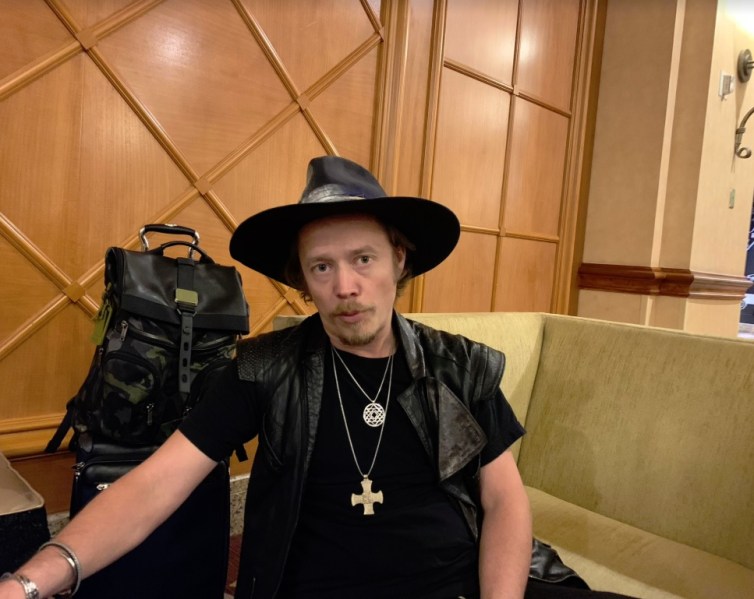
Above: Brock Pierce arrived for a whirlwind trip in Las Vegas for CoinAgenda.
GamesBeat: It seems like your whole life has been an adventure.
Brock Pierce: I live life like it’s a role-playing game [laughs]. I even have the uniform.
GamesBeat: The Mighty Ducks to virtual goods to social casino games and Bitcoin.
Pierce: Lots of things. I continually reinvent myself. It keeps things interesting.
GamesBeat: I remember, back when you were doing Playsino — you said you bought a lot of Bitcoin, and then, you couldn’t remember where the documentation was?
Pierce: Yeah, my first Bitcoins. The original position, I never found. But that’s neither here nor there. It’s kind of tuition. Most everyone, you either have it stolen from you or you lose it. That’s what happens. Especially back then. You didn’t have any of the infrastructure, any of the apps, any of the tools to manage it.
GamesBeat: But you bought in at a matter of cents?
Pierce: You didn’t really “buy in” in the early days. You mined it. If you were a gamer, you actually had good computers for mining. You’d just flip on your Alienware or whatever it is with a serious graphics card and that was good enough, back before you needed specialized hardware, whole farms of it.
GamesBeat: When was that?
Pierce: It would have been very late 2009, early 2010, when I started playing around with it. But I wasn’t very active in the first couple of years. My view was that Bitcoin or something like it was the future. I just didn’t know when the future was. It wasn’t until 2012 that it became a big part of my focus. That’s when I started migrating out of my gaming things. That’s more or less the time when you stopped seeing me.
GamesBeat: You stopped going to the game conferences, yeah. I never caught on, though. “What is this Bitcoin thing, and why is Brock so excited about it?”
Pierce: I’d been doing digital currency and games for a long time.
GamesBeat: Was it more based on the people you circulated with? This was becoming something they talked about?
Pierce: A small number of them, yeah. But I ended up educating most of the people I know. I wish there had been more people educating me. It’s nice when you have friends that say, “Hey, look at this.”
GamesBeat: Was it 2013, 2014 when you were forming the companies?
Pierce: Yeah, by 2013, I was forming a new company every 45 days. I was basically operating like an incubator. 2012 was mostly mining and studying what to do. A lot of it was spent being worried about its legal status. I spent a good six months thinking, “Wow, I’d be the highest-profile person in this industry that, reputationally, is only known for Silk Road and drugs. If they’re going to go after someone, which they might, I’d be the target.” Other than the Winklevoss brothers, who came in around that time as well.
But I spent a lot of time trying to think about how regulation might emerge. In the end, I got comfortable and became very public. I just decided that I wasn’t going to do any business in the United States. I’d have lawyers look at everything very carefully. My attitude is, if you play by the rules, dot your Is, cross your Ts, and avoid the U.S., everything should be OK. And then, the market obviously progressed. The media started writing about more than just the sensational use cases of the technology, as people became better educated. Obviously, that’s continued.
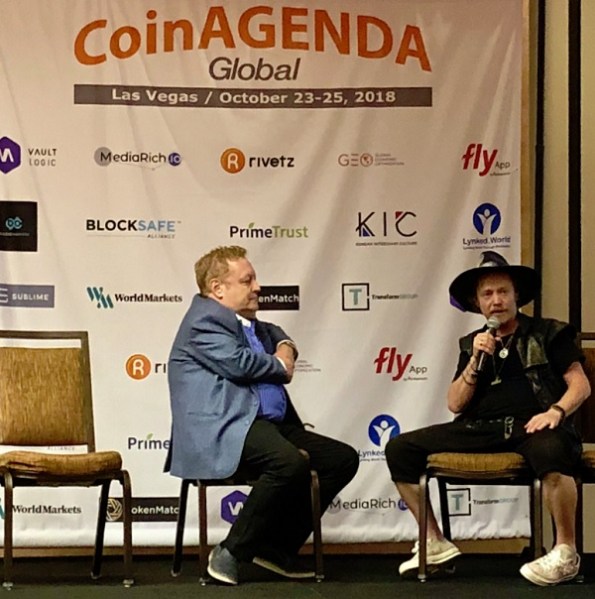
Above: Michael Terpin interviews Brock Pierce on stage at CoinAgenda event in Las Vegas.
GamesBeat: Did you detect a turning point, when it became more legit?
Pierce: From my perspective, that was 2012. But it all depends on your definition of that mark. I could make an argument on the other hand that we’re still not there yet. The big thing is what’s happening right now. Literally, in the last month, is the first time we’ve had a real blockchain functioning that you can build consumer applications on. The last 10 years have been the prototyping.
Think of it, in the days of the Internet, like the 1970s, 1980s, up until 1995. The last 10 years have essentially been building out the backend infrastructure so we can start to do real interesting scalable things with this technology. Call it the beginning of the consumer Internet. We’ve just begun that phase. Very few people, even in my industry, realize that.
Now, you can build games on the blockchain. I can show you an example of a very simple game. I go into a blockchain wallet. This is an app store for things built on a blockchain. This is 21, rolling dice. I’ve got a $2.70 bet. This is live over a blockchain. And I’m done. That’s a fully decentralized game. You can build World of Warcraft like this. You can build Facebook like this. You can now build real applications.
GamesBeat: I still detect a fair amount of skepticism in the core gaming circles, about whether or not it’s anything to do with them.
Pierce: It’s going to affect all of them — in the same way the Internet affected everybody. It might only be for simple things like payment. When you have no friction — imagine you’re playing FarmVille, and I can just pay like this. I’m not running through any slow, antiquated payment rail. This is clearly going to be very important for anyone building games if monetization is something other than advertising. If someone has a substantially higher lifetime value (LTV) off a similar type of game, you’re not going to be able to compete for user acquisition. Payments are a critical aspect of the games industry. Now, game developers don’t always fully realize that, but anyone who publishes does.
GamesBeat: It sounds like your gaming background helped you understand the opportunity here.
Pierce: I was Paypal’s largest merchant for three years. Project IGE, which is what became their credit card processing for companies, I demanded it. I was on their advisory board. I also launched Alipay. I drove all the early users in the beginning because I was so big with Paypal.
GamesBeat: Is it true that your own Bitcoin wealth is over $1 billion?
Pierce: I don’t talk about my own wealth. I very specifically talk about — a billionaire is someone who’s positively impacting the lives of a billion people. I’m trying to change the game. I call the game of life that most people are playing is the game of compound interest: the goal of trying to amass wealth, often for the purposes of serving self-interest. I’m trying to change that game. I’m playing the game of compounding impact. How do you positively impact as many lives as possible? I measure my successes in making the world a better place.
GamesBeat: You do want to give away a billion dollars, right?
Pierce: Forbes asked me what I have, and I said, “I’m not gonna answer that.” They said, “We’re pretty sure you have a billion dollars at this point.” I said, “Well, I fundamentally disagree with your definition.” [Laughs] They said they were going to list me anyway. I said, “OK, then if you’re going to list me, you can say that I plan on giving away my first billion dollars.”
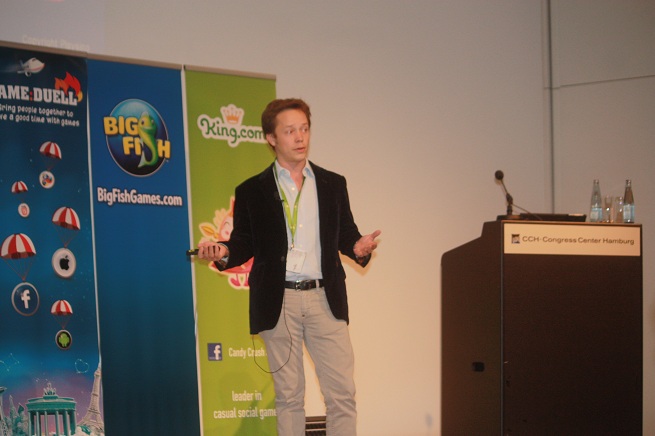
Above: Brock Pierce, was former head of Clearstone Global Gaming Fund and the ex-CEO of Playsino.
GamesBeat: What’s motivated you? What makes it fun? What’s been keeping you going?
Pierce: Well, it’s all fun. I often talk, tipping my hat to Satoshi [Nakamoto, the name for the anonymous creator of Bitcoin] and his Japanese pseudonym, about this concept of “ikigai,” which is figuring out what you’re good at, what you love, and what the world needs. The intersection of those three things is finding your life’s purpose.
GamesBeat: How much speaking have you been doing?
Pierce: I get asked to speak a few times a day. I have stopped committing to speaking for probably the last three to six months. Now, my whole calendar runs through — I do very little now, because I need to be in Puerto Rico. I can’t be on a plane everywhere. I’ve done enough of that. But I’m still probably giving a speech a week, on average.
GamesBeat: Once you’re back in the games business, we can bring you in to the GamesBeat conference again.
Pierce: Now that we actually have blockchains that can scale, we’re going to see a massive, massive wave of gaming stuff being built here. I’m thinking about setting up a fund only to invest in game companies that are building on EOS right now. More sector focused than what I was doing with Clearstone years ago.
GamesBeat: When did Puerto Rico become a passion for you?
Pierce: I used to go to Puerto Rico when I was a teenager. Then, I went down there in 2014 to start a bank because banking — crypto was really hard in 2013 [to] 2014. I went around looking at buying state chartered banks, federally chartered banks. I started to understand how credit unions work, how co-ops work. I was analyzing every struggling bank in the country that was for sale. I had the full list.
I made this a focus. Banking is a problem, so why don’t I own a bank? That didn’t seem like such a difficult thing. I knew how to access capital. It’s a money thing more than anything. It’s complicated to start. It was going to take so long that I eventually, being a hacker type, decided there has to be a back door. What about the U.S. Virgin Islands? What about Guam? What about Samoa? What about Puerto Rico?
I started talking to someone in Puerto Rico and they said, “Yeah, there’s this new legislation passed where you can create a thing called an international financial entity.” That allows you to build a bank that gives you access to the New York Fed, gives you the right to opt out of Federal Deposit Insurance Corp. (FDIC), but it’s essentially a bank. It’s not a bank, but it can do everything a bank can do. I was, I think, the first person to ever do it. Now, I think there’s 50 or 100 of them because Puerto Rico is a place where you can set up financial institutions more easily than any other part of the United States. Then, I moved down because of the hurricane.
GamesBeat: But the idea of a blockchain island, you fully believe in that?
Pierce: Those are other people’s words. I’m just down there to try to help. There’s not that many of us. We’re just a group of people that hopefully show up and are thought of in high regard for bringing a lot of valuable things to the island and for our philanthropic work. Not everyone is me, obviously. But I try to create a community. I live my life in service. I serve people serving first.
The people that do good things in the world are the people I help the most. It encourages a lot of that. That’s how you get meetings with me, basically. When I find out you put a solar panel on somebody’s roof, I’ll say, “Come over and hang out for a weekend.”
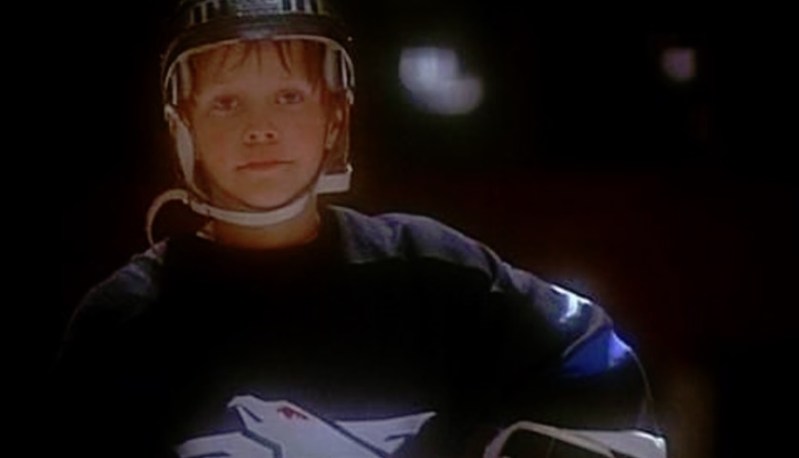
Above: Brock Pierce was a child actor in The Mighty Ducks.
GamesBeat: Is this all gathering momentum in Puerto Rico?
Pierce: Oh, yeah. We’ve accomplished a lot in 10 months. And in those first 10 months — it’s a big learning curve. I’ve had to learn the island. I have a ton more to learn. But you don’t just show and know what to do and how to do it. You have to build the relationships. You have to listen and familiarize yourself with the culture, understand what the problems are, the history of those problems, up to a point where you can start having conversations about solutions.
I’m not focused on blockchain. I’m focused on how to make Puerto Rico as cool as I can and help Puerto Rico with its restart, to the best of my abilities.
GamesBeat: You’ve gotten more famous doing this than you did as an actor.
Pierce: Well, I’m sure more people saw me in things like Mighty Ducks, but yeah. You’re just an actor in a film.
GamesBeat: You’ve also had to deal with some controversies. How do you feel about that side of things?
Pierce: I was dealt a really difficult hand at a young age for not having done anything wrong. Just by association and then, really bad, irresponsible journalism. I’m now addressing that for the first time. Rolling Stone did a big piece with me. Neil Strauss spent eight months working on a story that recently came out. It’s the first time I’ve actually gone deep into that with a journalist. I’ve done that just now with another major magazine. I’m releasing, some time in the next week or two, a 700-page file on everything that will forever put it to bed.
It’s a pain in the ass to clean up. I got sued by some people, in almost every instance not accusing me of having done anything wrong. I was sued along with Marc Nathanson, the billionaire, and the entire board of directors. I was on the board. Only one person ever accused me of doing something wrong, and he just got out of prison for committing fraud his entire life. It’s beyond ridiculous. Every single person dropped their case against me for nothing. But the media just keeps reporting on something. I’m finally putting out a piece there where I can sue the living shit out of anyone who does it again. And I intend to [laughs].
GamesBeat: You don’t seem to have been stymied by this, slowed down.
Pierce: Oh, no. It’s made everything in my life a lot harder. It’s like if you were playing a video game and you’ve got easy, medium, hard. I’ve had to play the game of life on something between hard and impossible. It does affect everything you do. It makes everything that much harder. It makes raising capital that much harder. It’s partnerships.
GamesBeat: But you’ve accomplished all that.
Pierce: And it’s made me really good because I had to play the game of life on a much harder setting than everybody else. But it hasn’t stopped me. If anything, it probably just made me a lot more talented.
GamesBeat: You now have these things to live up to: predictions about the tokenization of real estate, a quadrillion-dollar market there, venture capital going away. You truly believe this will happen, though.
Pierce: I believe that the tools are there for it to happen. I believe it’s the natural tendency as far as where the market will go. I was one of the founders of the first ICO. I put the first real-world asset, or securitized the first asset with Tether. I created the first digital security. I’ve done most of the major things in the industry, most of the firsts. So far, my past performance — it doesn’t mean I’ll be right about anything going forward, but I have a pretty good track record at seeing how things are developing.
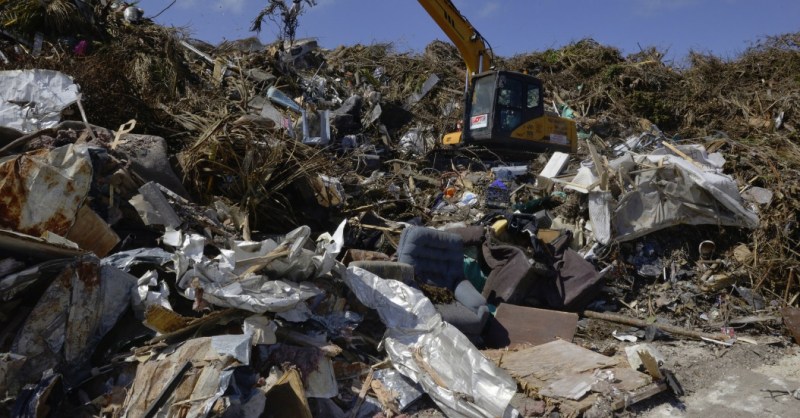
Above: After Hurricane Maria devastated Puerto Rico, Brock Pierce moved there to help it rebuild.
GamesBeat: The people who still fear it or believe it’s a scam, who believe that somehow it all has to come to an end, what’s your best argument against them?
Pierce: I tend not to argue with them. You’re welcome to your opinion. I need to understand that specific individual, why they feel that way. Nine times out of 10, they’re not informed. They haven’t done the work to have an informed opinion. Normally, it’s people that heard a bit about it thinking they understand it but not having done enough work to understand it. Then, they form an opinion, and they can’t even describe what money is, nine times out of 10. Or 99 out of 100. They don’t know what money really is, where it comes from, how it works. You’re dealing with a lack for knowledge most of the time.
What happens, then, is that they passed. All of a sudden, the price went up, and now, they feel emotional. They’re emotionally tied to it in part because — I hated on it before, and now, I have to keep hating because I wish I’d made a lot of money. It becomes this thing that festers. But you have to know why someone thinks that. There’s 100 reasons that someone might think it’s bad. There’s 100 reasons I can tell you why they might be wrong. But you need to understand the specifics.
People would come up to me and say that Bitcoin is a scam. “Why should I want Bitcoin?” And I’d say, “You shouldn’t. It’s not for you.” If you have a bank account, if you have a piece of plastic in your pocket that lets you conveniently pay for things, and you have faith in the system and rule of law that’s here to protect you, and of the 200 currencies in the world, you’ve got one that everyone wants more of, this is not going to change your life. You don’t need it. It might save you one or two percent, or if you’re a speculator, you make some money, but based on what you said, you’re not going to be speculating long, and I certainly wouldn’t advise you to speculate short.
But it’s not going to change your life. It’s immaterial to you. You’re blessed. You’re one of the people that live in a place where you have these wonderful tools. It’s not going to make most Americans’ lives better. You have 3 billion people on the planet that don’t have any financial services whatsoever and another 2 billion people with limited access to financial services. Two-thirds of the population of the planet do not have those financial tools you take for granted.
It’s south of the border. It’s Africa. It’s Southeast Asia. In the same way that Africa leapfrogged wired communications and went straight to wireless, these are the people who stand to benefit. The most advanced payment market in the world is Kenya because the need is greatest. This is going to change their lives by an order of magnitude. If you were remaking Maslow’s hierarchy of needs today, Internet and financial tools are probably basic human rights at this point. Without those, you can’t live a prosperous life.
GamesBeat: Is the mortgage proposition a convincing one? Can you explain that again?
Pierce: What you end up with is peer-to-peer financing over time, more and more. Banks, you give them a lot of money, and then, they leverage that money. They loan it out to people. It’s not their money. They’re taking your money and printing a bunch more to loan it out to people. We can start doing peer-to-peer loans. Institutional family offices can start doing these things directly. When you have tools that automate this process and allow for fractionalized ownership, I don’t see how it can end any other way, unless government legislates it out of possibility.
GamesBeat: And fractionalized ownership leads to much higher prices than you can get for your property?
Pierce: Yeah because it creates liquidity. Once you have more liquidity, once people can buy and sell a share in your house, or a share in that shopping mall, or a share in a casino, or you can buy blocks of zip codes — you can say, “I want to buy all commercial in downtown Vegas. I want to buy only residential in this zip code. I only want to buy at this price.”
When you start to create a really efficient market by putting in place the best tools possible, it’s going deliver incredible efficiency. With that efficiency comes liquidity. With more liquidity, you always get higher prices. And then, independently of that, fiat money is going to continue to have problems. We’re looking at a recession, maybe even something worse than a great depression around the corner. What’s going to happen is you’ll see a flight to hard assets. People will be buying more real estate, buying more gold. Crypto isn’t big enough. Gold has been around for 5,000 years. If the world runs into a problem, it’s going to be a rush for gold and real estate. Crypto is still too new and not yet proven.
GamesBeat: This is just one disruption of many that will happen, do you think?
Pierce: The Internet is broken. When the Internet was originally being designed, it was known how to secure it, what cryptography was needed, but we didn’t have the computer processing power at the time to do so, and they didn’t want it to be secure. They wanted it to have a back door. The reason we have so many security problems all over the Internet is because the Internet has been built on sand. It’s been built on a faulty foundation.
The blockchain is going to add the security layer. Everything on the Internet today is going away. Every single thing that’s there is going away. It’s all going to be rebuilt using a new stack, of which blockchain is likely to be the security layer that enables us to have money there, to have assets there, to have voting there, to do all the things you need a highly secure, impenetrable, immutable system for. But I believe the entire Internet is going to be replaced and upgraded.
That doesn’t mean Google won’t be a survivor. It’s like businesses pre-Internet and post-Internet, pre-mobile and post-mobile. We go through these cycles. Everybody has to be part of those waves or you find yourself extinct. I truly believe that’s how big a deal this is. I believe the impact this technology is going to have on the world is 10 times more than the Internet had. The Internet was just information. It democratized the movement of information. We’re now talking about democratizing all value.
GamesBeat: And venture capitalists could be extinct because of what, again?
Pierce: You’re already seeing that. VCs aren’t even VCs anymore. Most of them are wannabes, pretenders, fakes. They’ve become financial engineers. Most of them have never worked in a startup. They’ve just gone to an Ivy League school, learned how banking works, and become financial engineers. They’re not VCs as I like to think of them. I think of venture capitalists as people that actually help startups and entrepreneurs. That’s a dying breed today. There are still some but fewer and fewer as the financial engineers from Wall Street continue to take over the industry, which has been happening for the last 15 [to] 20 years.
Right now, if you’re a startup and you have a great company, do you raise money from VCs or do you raise money in a token sale? I can tell you what people are doing. They’re not taking VC anymore. Our sector is already four times bigger than VC. I don’t know many smart entrepreneurs that are taking VC anymore. Most people are already making a movement in this direction, which brings liquidity. It’s better terms for the entrepreneur. It’s liquidity for everybody involved. It’s democratized.
Basically, venture capital had a stranglehold over startups. They were the only ones with the capital. If you wanted to build startups, you had to talk to VCs. There was no alternative. Now that there’s an alternative, that’s going to be very disruptive. And not just an alternative but a vastly superior alternative.
GamesBeat: I’ve seen Andreessen Horowitz buying a bunch of tokens.
Pierce: They’re in the space. But I’m not saying they’re all going out of business. They’re going to become more like hedge funds. The world is changing. I’m not saying the VCs are all going to be gone. It’s no longer going to exist in the way it exists today. It’ll be something different. It may still be called VC, but it’s going to be disrupted by the democratization of access.
It’s not just special people that are friends with Marc Andreessen that are going to have access to venture. Everybody’s going to be getting access over time. There’s going to be liquidity. There’s going to be greater access to capital. You’ll have to be very competitive. Historically, VCs sit around and say, “Come to me,” and everybody has to come to them. They’ll have to go chase down the hottest entrepreneurs in the world. It’ll be a very different game. I think most of the VCs of today won’t want to work that hard.
The VCs of tomorrow, the people that finance innovation, will be much hungrier, much more aggressive. They won’t need a fund. You can invest your own money. It’s more like what you see on Angel List. But it’ll be much bigger.
GamesBeat: If you really did give away a billion dollars, is there something you’d want to accomplish before that? Is there something you look at and say, “I have to get this done with this capital to fulfill a dream?”
Pierce: No, because my lifestyle hasn’t changed in all the time you’ve known me. Same dude. I care less about what I wear, I guess? But other than that, I have consistent access to capital. I can keep doing things. Money is like energy. Energy likes to flow, like Bruce Lee said about water. I don’t really need much. I’m going to keep innovating. I’m just getting started. I don’t need to amass a ton of wealth for myself.
I love this organization, Charity Water. I don’t know if you’re familiar with them. They’ve given away about $350 million to build wells in places like Africa, so they have clean drinking water. It’s a guy who could be a product manager at Facebook or Google, or a rock star entrepreneur. People say, “Why don’t you do a startup and make a bunch of money, and once you have that money, you could do this.” He says, “I’ve given away $350 million. Why do I have to go do something I don’t want to do to make money to give away in the way that I want to? I can already do that.”
When you start to get world-class [entrepreneurs], world-class executives building startups with social impact, you start to see this sort of stuff. You don’t have to make your money to make a difference. You can do it all at once by trying to solve problems in ways that nobody else has. Charities and philanthropic work, that’s one of the areas that needs some upgrading. It’s not known for its efficacy. It’s not known for efficient use of capital. It’s more akin to government than to startups.
GamesBeat: Anything else you want to talk about today?
Pierce: The only thing is if I were a game developer right now, I would be looking at building something on EOS. I almost don’t want to be telling people because this is literally like when Facebook opened up their APIs. This is Zynga all over again. It’s one of the greatest opportunities I’m aware of in my space, one of the greatest opportunities I’m aware of in the world.
As a guy that’s done social gaming, mobile gaming, all those things — I’ve been telling people for the last five years. They come to me and say, “Should I do something in gaming?” I’ve said no because there was nothing to do yet. For five years, I’ve told people, “Nope, not ready.” My opinion has now changed. The systems weren’t there to do it. You can talk about building games on blockchain, but it’s not going to work. It’s a cool theoretical idea, but you can’t do it. But now it’s possible. You can build stuff on EOS today, and there will be other chains in the future.
GamesBeat: And that’s because?
Pierce: It scales. You can build just about anything, and the payment rails are so much better than Facebook or mobile. It’s like Facebook or mobile in the heyday. I’ll wager on that. I’ll wager that a year from now, we’ll have seen something insane happen exactly there and for this industry. Now is the time. I’m happy to help and educate the industry.
GamesBeat: Not CryptoKitties but something more.
Pierce: CryptoKitties is one of those very important first movers. The problem is the Ethereum network doesn’t work well enough yet. It breaks. But that’s the beginning. You’re seeing these little games. Now, it’s there. Now, you can build everything from FarmVille to Bingo Madness. You can do all these things now with higher LTVs, better conversation, better play rates, all the stats. I already have the data. It’s good.
